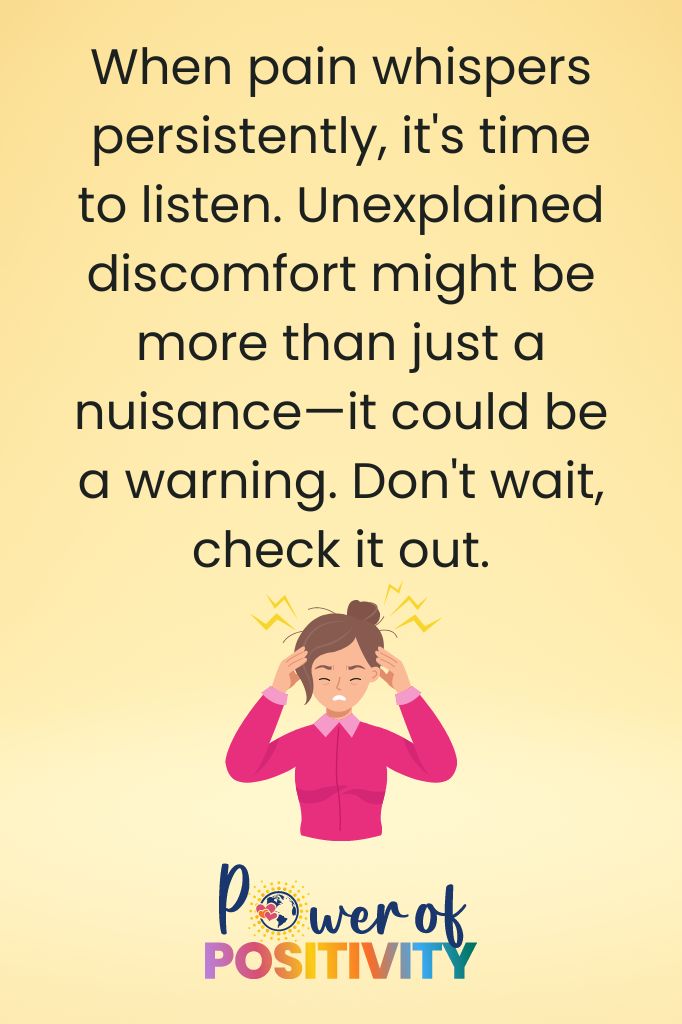Cancer doesn’t announce itself loudly. Often, the early signs can be subtle—easy to brush off as minor inconveniences. But ignoring them could mean missing the chance to catch the disease at a stage when it’s most treatable.
While symptoms like fatigue or weight loss might seem unrelated to cancer, they could be red flags your body is using to signal that something isn’t quite right. Recognizing these signs could save your life.
In this guide, I’ll walk you through the key symptoms to watch for. You’ll learn about the subtle changes your body makes when cancer is growing, and, more importantly, when to seek medical advice. Stay informed—it’s one of the best ways to protect your health.
Is Unexplained Weight Loss or Gain a Sign of Cancer?
Unexplained weight loss can indeed be an early warning sign of cancer, particularly for cancers affecting the digestive system such as pancreatic, liver, or ovarian cancer.
When the body is fighting cancer, it may consume more energy or alter how nutrients are processed, leading to weight loss.
This is often one of the first noticeable symptoms, especially for pancreatic cancer, where it’s common to lose weight due to the body’s inability to absorb nutrients properly.
In pancreatic and liver cancers, tumors can interfere with digestion, reducing the appetite and causing nutrient deficiencies. Ovarian cancer can also lead to weight changes, sometimes resulting in bloating or fluid retention (ascites), which might initially mask weight loss.
Other Causes of Unexplained Weight Loss
Weight loss isn’t always a sign of cancer. It can be caused by other factors such as:
 Stress or Anxiety: Emotional distress can suppress appetite, leading to sudden drops in weight.
Stress or Anxiety: Emotional distress can suppress appetite, leading to sudden drops in weight. Dietary Changes: A shift in eating habits or restrictive diets might lead to unintentional weight loss.
Dietary Changes: A shift in eating habits or restrictive diets might lead to unintentional weight loss. Thyroid Conditions: Overactive thyroid (hyperthyroidism) speeds up metabolism, leading to weight loss despite regular or increased food intake.
Thyroid Conditions: Overactive thyroid (hyperthyroidism) speeds up metabolism, leading to weight loss despite regular or increased food intake.
Always consult with a doctor if unexplained weight changes occur to rule out serious conditions like cancer.
Can Persistent Fatigue Indicate Cancer?
Yes, persistent fatigue, especially when it doesn’t improve with rest, can be a sign of cancer. It’s one of the most common symptoms of blood cancers like leukemia and lymphoma.
Cancer-related fatigue (CRF) is much more severe than typical tiredness—it can leave you feeling completely drained, physically and mentally, to the point where even small tasks seem overwhelming.
This type of fatigue can persist long after cancer treatments like chemotherapy or radiation have ended, making it a chronic issue for many cancer survivors.
The fatigue stems from various factors. Cancer treatments can damage healthy cells alongside cancer cells, depleting your energy levels.
The cancer itself also takes a toll, often causing anemia, disrupting sleep, and weakening the muscles. In some cases, the emotional stress and anxiety tied to a cancer diagnosis further contribute to this overwhelming tiredness.-
How Is Cancer-Related Fatigue Different From Normal Tiredness?
Unlike regular fatigue, cancer-related fatigue doesn’t get better with sleep or rest. You might wake up just as tired as when you went to bed.
In fact, cancer fatigue is persistent, lasts longer, and interferes with daily life more intensely than ordinary tiredness.
How to Manage Cancer-Related Fatigue
Though challenging, there are several ways to manage cancer-related fatigue:
 Exercise: Gentle activities like walking or yoga can help reduce fatigue and boost energy levels.
Exercise: Gentle activities like walking or yoga can help reduce fatigue and boost energy levels. Nutrition: Maintaining a balanced diet with sufficient calories and nutrients is crucial for combating fatigue.
Nutrition: Maintaining a balanced diet with sufficient calories and nutrients is crucial for combating fatigue. Good Sleep Hygiene: Establishing a regular sleep schedule and limiting naps can improve sleep quality and help manage energy.
Good Sleep Hygiene: Establishing a regular sleep schedule and limiting naps can improve sleep quality and help manage energy. Stress Management: Techniques like meditation or counseling may alleviate emotional factors contributing to fatigue.
Stress Management: Techniques like meditation or counseling may alleviate emotional factors contributing to fatigue.
If you’re dealing with ongoing fatigue, it’s essential to talk to your healthcare provider to explore treatments or support that can make a real difference.
Why Should You Pay Attention to Unusual Pain?

Chronic, unexplained pain—especially in areas like the back or head—can sometimes be an early indicator of cancers such as bone or brain cancer. For example, a brain tumor can cause persistent headaches that feel different from typical migraines, often worsening in the morning or causing nausea.
Similarly, bone cancer can present with dull, persistent pain that worsens at night and doesn’t improve with rest. These pains often arise due to pressure on nerves or tissues near tumors.
In many cases, cancer-related pain is not fleeting; it can persist for weeks and may not respond to over-the-counter medications.
If pain feels unusual or different from what you’re used to, it’s crucial to consult a healthcare provider, as early diagnosis could lead to more effective treatments
How Can You Tell if Pain Is Due to Cancer?
While chronic pain can be a sign of cancer, other medical conditions can mimic these symptoms:
 Migraine or Tension Headaches: Often caused by stress or lifestyle factors, but they typically respond to medication or changes in habits.
Migraine or Tension Headaches: Often caused by stress or lifestyle factors, but they typically respond to medication or changes in habits. Arthritis or Osteoporosis: These conditions can cause ongoing bone and joint pain but usually improve with physical therapy or anti-inflammatory drugs.
Arthritis or Osteoporosis: These conditions can cause ongoing bone and joint pain but usually improve with physical therapy or anti-inflammatory drugs. Muscle Strains or Injuries: Unlike cancer pain, which worsens over time, these conditions often improve with rest and treatment.
Muscle Strains or Injuries: Unlike cancer pain, which worsens over time, these conditions often improve with rest and treatment.
What Skin Changes Could Indicate Cancer Growth?
Skin changes are one of the more visible indicators of potential cancer, especially when it comes to skin and liver cancers. Here are some of the most important changes to watch out for:
Moles
Any mole that changes in size, shape, or color, or develops irregular borders or new textures, could be a sign of melanoma, the most aggressive form of skin cancer.
Look for moles that seem to stand out or follow the ABCDEs of melanoma (Asymmetry, Border irregularity, Color variation, Diameter larger than a pencil eraser, and Evolution in size or appearance).
Jaundice
This yellowing of the skin and eyes can indicate liver issues, including liver cancer. It occurs when bile builds up in the bloodstream due to the liver’s reduced ability to process it, a common symptom of advanced liver disease.
New or Unusual Skin Growths
Basal cell carcinoma and squamous cell carcinoma often present as bumps, red patches, or sores that don’t heal. These cancers typically develop in areas exposed to the sun, such as the face and neck.
Sores That Don’t Heal
Any sore that doesn’t heal within a few weeks or constantly bleeds could indicate skin cancer. Open wounds that recur in the same spot are particularly concerning.
Could Unexplained Bleeding or Bruising Be a Sign of Cancer?

Yes, unexplained bruising or bleeding could indicate a form of blood cancer, such as leukemia. In these cases, the body’s ability to form blood clots is impaired, typically due to a low number of platelets, which are essential for blood clotting.
This condition is known as thrombocytopenia and often results in frequent or unusual bruising, even from minor bumps, or excessive bleeding from small cuts.
For instance, leukemia can cause the bone marrow to produce abnormal white blood cells, which crowd out healthy cells responsible for blood clotting.
As a result, individuals may notice frequent nosebleeds, bleeding gums, or bruises that appear without any injury.
Other symptoms of blood cancers include
- Frequent infections
- Extreme fatigue
- Pale skin
- Night sweats
FAQs
Are Changes in Bathroom Habits a Warning Sign of Cancer?
Yes, unexplained changes in bowel or bladder habits can be a sign of cancers such as colorectal, bladder, or prostate cancer. Persistent diarrhea, constipation, blood in the stool, or urinary issues like frequent urination, urgency, or difficulty can signal something more serious. If these symptoms last for more than two weeks, you should consult a doctor.
Should You Be Concerned About Lumps or Swelling in Your Body?
Lumps or swelling can indicate cancers like breast cancer, testicular cancer, or lymphoma. Not all lumps are cancerous, but if you find a lump that is painless, hard, and grows over time, it’s essential to get it checked by a healthcare professional.
Why Should a Chronic Cough or Hoarseness Not Be Ignored?
A persistent cough or hoarseness lasting more than two weeks could be a warning sign of lung cancer, throat cancer, or thyroid cancer. There is a need for immediate medical attention if there is chest pain, bloody coughing, or difficulty swallowing.
When Should You See a Doctor for These Symptoms?
If symptoms like unexplained weight loss, persistent fatigue, abnormal bleeding, or changes in bathroom habits last for more than two weeks, it’s time to see a doctor. Early detection is critical in diagnosing and treating cancer effectively.
Final Thoughts
Cancer often whispers before it screams. That’s why it’s so important to catch those subtle signs early. Pay attention to your body—it’s trying to tell you something.
From persistent coughs to mysterious bruises, small changes can make a big difference.
If something feels off, don’t wait. Get checked. Early action saves lives. And remember, when it comes to your health, trust your gut—literally and figuratively!
After all, you know your body best. Stay vigilant, stay healthy.
The post What Are The 10 Warning Signs Cancer Is Growing in Your Body? appeared first on Power of Positivity: Positive Thinking & Attitude.








 Stress or Anxiety: Emotional distress can suppress appetite, leading to sudden drops in weight.
Stress or Anxiety: Emotional distress can suppress appetite, leading to sudden drops in weight. Dietary Changes: A shift in eating habits or restrictive diets might lead to unintentional weight loss.
Dietary Changes: A shift in eating habits or restrictive diets might lead to unintentional weight loss. Thyroid Conditions: Overactive thyroid (hyperthyroidism) speeds up metabolism, leading to weight loss despite regular or increased food intake.
Thyroid Conditions: Overactive thyroid (hyperthyroidism) speeds up metabolism, leading to weight loss despite regular or increased food intake.
 Exercise: Gentle activities like walking or yoga can help reduce fatigue and boost energy levels.
Exercise: Gentle activities like walking or yoga can help reduce fatigue and boost energy levels. Nutrition: Maintaining a balanced diet with sufficient calories and nutrients is crucial for combating fatigue.
Nutrition: Maintaining a balanced diet with sufficient calories and nutrients is crucial for combating fatigue. Good Sleep Hygiene: Establishing a regular sleep schedule and limiting naps can improve sleep quality and help manage energy.
Good Sleep Hygiene: Establishing a regular sleep schedule and limiting naps can improve sleep quality and help manage energy. Stress Management: Techniques like meditation or counseling may alleviate emotional factors contributing to fatigue.
Stress Management: Techniques like meditation or counseling may alleviate emotional factors contributing to fatigue. Migraine or Tension Headaches: Often caused by stress or lifestyle factors, but they typically respond to medication or changes in habits.
Migraine or Tension Headaches: Often caused by stress or lifestyle factors, but they typically respond to medication or changes in habits. Arthritis or Osteoporosis: These conditions can cause ongoing bone and joint pain but usually improve with physical therapy or anti-inflammatory drugs.
Arthritis or Osteoporosis: These conditions can cause ongoing bone and joint pain but usually improve with physical therapy or anti-inflammatory drugs. Muscle Strains or Injuries: Unlike cancer pain, which worsens over time, these conditions often improve with rest and treatment.
Muscle Strains or Injuries: Unlike cancer pain, which worsens over time, these conditions often improve with rest and treatment.